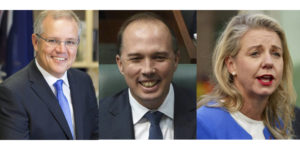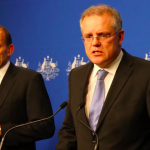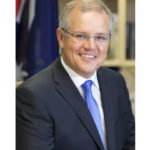‘Sports Rorts’ Scandal: 43% of Grants Were Ineligible

On the back of a politically controversial 2019, you might think Prime Minister Scott Morrison couldn’t possibly find himself embroiled in yet another public relations disaster.
But the PM has proven us wrong, with the latest ‘sports rort’ scandal, another mess which has members of the Coalition accused of dishonestly obtaining benefits by deception.
The PM has adamantly defended the $100 million program, but a recent senate inquiry heard that a whopping 43% of projects which were awarded grants in the lead up to the 2019 federal election were not eligible for the money.
Scott Morrison has repeatedly asserted that all grants were above board and made in respect of eligible projects, but figures presented by the Australian National Audit Office (ANAO) tell a very different story.
In many cases, the projects ticked off by Sports Australia were found to have fallen short of the selection criteria – and funds were allocated to marginal electorates, the inference being that this was done to enhance the prospects of Coalition MPs in those electorates keeping their seats.
‘Virtual slush fund’
Despite Mr Morrisons’s assurances on national television that “Every single one of the projects approved was eligible, every rule followed in relation to the program,” his government stands accused of using the sports grants program as a virtual slush fund for its re-election efforts, overlooking projects approved by an independent panel in favour of splashing cash in ‘targeted’ seats.
And Peter Dutton is also in the thick of the scandal, as his electorate received a $200,000 grants just six months before the electorate, where he won his seat by the barest of margins. The grant was awarded to The Pine Rivers Rowing to build a new boat shed.
In making its presentation to the senate inquiry, the ANAO was highly critical of the way grants were assessed and awarded ahead of last year’s election. It found there was “distributional bias” in the way projects were approved. Many of the grants, it found, were awarded to bodies within marginal seats or seats the Coalition wanted to win.
One of the most damning accusations is that the PM’s office made “direct” representations about which projects should be funded, and the Liberal National Party of Queensland submitted a wish-list of projects in a key marginal seat.
‘Secret’ internal investigation
While the ANAO had previously pushed the PM to engage departmental secretary Phil Gaetjens to conduct an investigation, that report remains has been kept secret. Last week, a ‘summary’ of the report’s conclusions was published as pressure mounted.
Mr Gaetjens’ report led to the standing down of Nationals Deputy Leader Bridget McKenzie – who oversaw the allocation of funds – after it was revealed that she breached ministerial standards by failing to declare her membership in a clay shooting club that received funding.
Prior to standing down from her position, Ms McKenzie claimed “no rules were broken” and that she used discretionary powers “for a purpose”, which was allowed by the program’s guidelines. She proceeded to explain that this led to “more projects… [being] supported and funded in Labor seats than if that ministerial discretion had not been deployed.”
In the wake of recent revelations, there are now calls for her to resign.
Scott Morrison has tried to distance himself from the entire issue, claiming he had little influence over the program.
Laws governing public expenditure
There are a range of laws in Australia which are meant to regulate public spending.
For example, section 71 of the Public Governance, Performance and Accountability Act 2013 prohibits Ministers from approving the expenditure of public money unless satisfied, after making reasonable inquiries, this would be a “proper use” of the money. “Proper” is defined as meaning “efficient, effective, economical and ethical”.
There are also a number of regulations, including the Commonwealth Grants Rules and Guidelines of 2017, which prohibit Ministers from approving grants without first receiving written advice from officials on the merits of the proposed grants, and requiring them to record, in writing, the basis for the approval, relative to the grant guidelines and the principle of achieving value for money.
Any ensuing investigation into the ‘sports rorts’ scandal would need to determine whether decisions made about the allocation of funds breached these laws and regulations.
Calls for a federal watchdog
There are now also calls for a national Independent Commission Against Corruption (ICAC) to oversee federal matters. Currently ICAC and its equivalent peer bodies are state-based. Along with the Greens and Independent Tasmanian senator Jackie Lambie, Warringah Independent MP Zali Steggall has also been vocal in calling for a deeper probe into the scheme, along with greater transparency and more accountability.
In her electorate in Sydney, the Mosman Rowing Club, was given a $500,000 grant in the lead up to the 2019 Federal Election, as she was campaigning against former Prime Minister Tony Abbott.
As more information comes to light, it is difficult to ignore the fact that the whole scandal reeks of corruption, with very serious accusations that public money was intentionally spent by the government in places where it had the potential to influence the election result.
One of the greatest criticisms of this government has been its secrecy. And in fact, last week every Coalition politician in the House of Representatives voted to block draft legislation to establish a robust corruption watchdog, defeating it 72-70.
This really does beg the question: what exactly do they have to hide?








